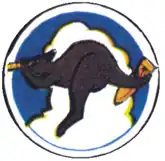435th Bombardment Squadron
The 435th Bombardment Squadron, also known as the "Kangaroo" Squadron, is an inactive United States Air Force unit. It was last assigned to the Eighth Air Force 333d Bombardment Group, based at Kadena Air Base, Okinawa. It was inactivated on 28 May 1946.
| 435th Bombardment Squadron | |
|---|---|
 B-17E Flying Fortress of the 435th Squadron[note 1] | |
| Active | 1942–1944; 1944; 1944–1946 |
| Country | |
| Branch | |
| Role | Bombardment |
| Nickname(s) | Kangaroo Squadron[1] |
| Engagements | Southwest Pacific Theater Pacific Ocean Theater |
| Decorations | Distinguished Unit Citation |
| Insignia | |
| 435th Bombardment Squadron emblem (approved 6 May 1943)[2] |  |
History
Combat in the Southwest Pacific
Formed in Australia in early 1942 by a combination of Fifth Air Force personnel and Boeing B-17 Flying Fortress aircraft that escaped from the Philippines and replacement aircraft that reached Australia from Hawaii and via the South Atlantic air ferry route from Florida, and arriving in Western Australia. As the 40th Reconnaissance Squadron, the squadron evacuated General Douglas MacArthur and President Manuel Quezon from Del Monte Field in the Philippine Islands in March 1942.
Redesignated as 435th Bombardment Squadron and engaged in strategic bombardment and reconnaissance of enemy targets in New Guinea; Coral Sea and Solomon Islands from Northern Queensland. The 435th Squadron operated primarily as a reconnaissance squadron in the Southwest Pacific area. Two thirds of more than 540 combat missions in the Australian Theater were reconnaissance missions. All of the 168 missions out of Hawaii and the Fiji Islands were patrols. Although a portion of the 19th Bombardment Group in Australia, technically speaking, this squadron operated independently of the group and under the direct supervision of the 5th Bomber Command. Photographs and information went directly to 5th Bomber Command. Withdrawn from combat in November 1942 when the B-17C/E models in Australia were replaced by long-range Consolidated B-24 Liberators.
Training unit
The unit was returned to the United States and became an operational training unit with II Bomber Command for replacement B-17 personnel.
Return to the Pacific
The squadron was again activated at Dalhart Army Air Field, Texas on 7 July 1944, but this time was assigned to the 333d Bombardment Group. The 333d Group was a former heavy bomber training unit that had been inactivated in the spring of 1944[3] in a general Army Air Forces reorganization of its training and support units.[4] It was reactivated in July as a Boeing B-29 Superfortress group. The squadron trained with Superfortresses until June 1945, when it departed for the Pacific to become an element of Eighth Air Force, which was organizing on Okinawa[5] as a second very heavy bomber air force in the Pacific. However, the squadron did not arrive at its combat station, Kadena Airfield, until it was too late to participate in combat. The squadron flew show-of-force missions and its aircraft helped evacuate prisoners of war from Japan to airfields in the Philippines. The unit was inactivated on 28 May 1946.[2][3]
Lineage
- 40th Reconnaissance Squadron formed on 14 March 1942, by authority of War Department but apparently without formal constitution and activation.
- Redesignated 435th Bombardment Squadron (Heavy) on 22 April 1942
- Inactivated on 1 April 1944
- Redesignated 435th Bombardment Squadron, Very Heavy and activated on 1 April 1944
- Inactivated on 10 May 1944
- Activated on 7 July 1944
- Inactivated on 28 May 1946[2]
Assignments
- 19th Bombardment Group, 14 March 1942 – 1 April 1944 (attached to Allied Air Forces, c. 17 July–c. 24 September 1942)
- 19th Bombardment Group, 1 April–10 May 1944
- 333d Bombardment Group, 7 July 1944 – 28 May 1946[2]
Stations
- RAAF Base Townsville, Australia, 14 March–c. 15 November 1942
- Pocatello Army Air Field, Idaho, C. 30 December 1943
- Pyote Army Air Base, Texas, 5 January 1943 – 1 April 1944
- Great Bend Army Air Field, Kansas, 1 April– 10 May 1944
- Dalhart Army Air Field, Texas, 7 July 1944
- Great Bend Army Air Field, Kansas, 10 December 1944 – 19 June 1945
- Kadena Airfield, Okinawa, 5 August 1945 – 28 May 1946[2]
Aircraft
- Consolidated LB-30 Liberator, 1942
- Boeing B-17 Flying Fortress, 1942–1944
- Boeing B-29 Superfortress 1944–1946[2]
Notes
- Aircraft is Boeing B-17E Flying Fortress, serial 41-2656, "Chief Seattle". Assigned to the squadron on 29 May 1942. it was Lost over Buna, Papua New Guinea, 14 August 1942 on a reconnaissance mission, crew missing in action.
References
- Dunn, Peter (4 September 2019). "435th Bomb Squadron The "Kangaroo Squadron" 19th Bomb Group - USAAF in Australia During WWII". Australia @ War. Retrieved 14 January 2020.
- Maurer, Combat Squadrons, pp. 537-538
- Maurer, Combat Units, pp. 213-214
- See Goss, p. 75 (details of 1944 reorganization).
- Maurer, Combat Units, p. 463
Bibliography
![]() This article incorporates public domain material from the Air Force Historical Research Agency.
This article incorporates public domain material from the Air Force Historical Research Agency.
- Edmonds, Walter D. (1992) [1951]. They Fought With What They Had: The Story of the Army Air Forces in the Southwest Pacific 1941-1942 (PDF) (reprint ed.). Washington, DC: Center for Air Force History. Retrieved 7 February 2018.
- Goss, William A. (1955). "The Organization and its Responsibilities, Chapter 2 The AAF" (PDF). In Craven, Wesley F.; Cate, James L. (eds.). The Army Air Forces in World War II. Vol. VI, Men & Planes. Chicago, IL: University of Chicago Press. LCCN 48003657. OCLC 704158. Retrieved 17 December 2016.
- Maurer, Maurer, ed. (1983) [1961]. Air Force Combat Units of World War II (PDF) (reprint ed.). Washington, DC: Office of Air Force History. ISBN 0-912799-02-1. LCCN 61060979. Retrieved 17 December 2016.
- Maurer, Maurer, ed. (1982) [1969]. Combat Squadrons of the Air Force, World War II (PDF) (reprint ed.). Washington, DC: Office of Air Force History. ISBN 0-405-12194-6. LCCN 70605402. OCLC 72556.
.svg.png.webp)